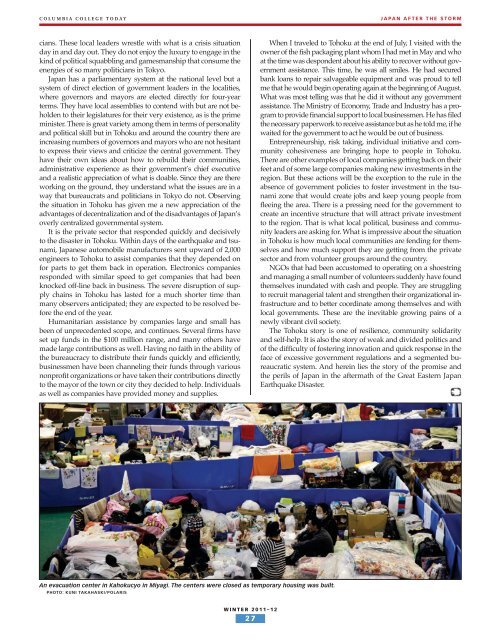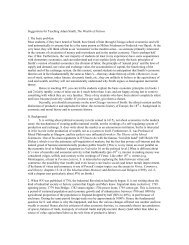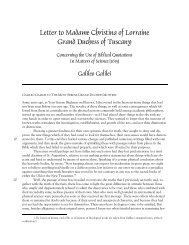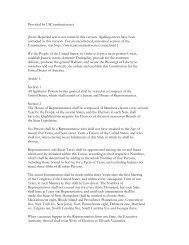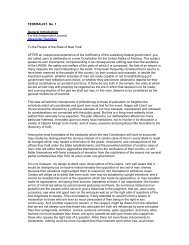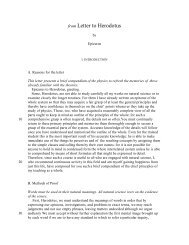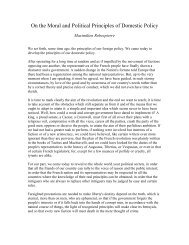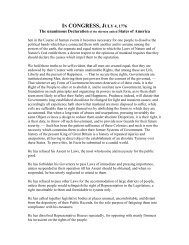Japan Storm - Columbia College - Columbia University
Japan Storm - Columbia College - Columbia University
Japan Storm - Columbia College - Columbia University
Create successful ePaper yourself
Turn your PDF publications into a flip-book with our unique Google optimized e-Paper software.
COLUMBIA COLLEGE TODAY JAPAN AFTER THE STORM<br />
cians. These local leaders wrestle with what is a crisis situation<br />
day in and day out. They do not enjoy the luxury to engage in the<br />
kind of political squabbling and gamesmanship that consume the<br />
energies of so many politicians in Tokyo.<br />
<strong>Japan</strong> has a parliamentary system at the national level but a<br />
system of direct election of government leaders in the localities,<br />
where governors and mayors are elected directly for four-year<br />
terms. They have local assemblies to contend with but are not beholden<br />
to their legislatures for their very existence, as is the prime<br />
minister. There is great variety among them in terms of personality<br />
and political skill but in Tohoku and around the country there are<br />
increasing numbers of governors and mayors who are not hesitant<br />
to express their views and criticize the central government. They<br />
have their own ideas about how to rebuild their communities,<br />
administrative experience as their government’s chief executive<br />
and a realistic appreciation of what is doable. Since they are there<br />
working on the ground, they understand what the issues are in a<br />
way that bureaucrats and politicians in Tokyo do not. Observing<br />
the situation in Tohoku has given me a new appreciation of the<br />
advantages of decentralization and of the disadvantages of <strong>Japan</strong>’s<br />
overly centralized governmental system.<br />
It is the private sector that responded quickly and decisively<br />
to the disaster in Tohoku. Within days of the earthquake and tsunami,<br />
<strong>Japan</strong>ese automobile manufacturers sent upward of 2,000<br />
engineers to Tohoku to assist companies that they depended on<br />
for parts to get them back in operation. Electronics companies<br />
responded with similar speed to get companies that had been<br />
knocked off-line back in business. The severe disruption of supply<br />
chains in Tohoku has lasted for a much shorter time than<br />
many observers anticipated; they are expected to be resolved before<br />
the end of the year.<br />
Humanitarian assistance by companies large and small has<br />
been of unprecedented scope, and continues. Several firms have<br />
set up funds in the $100 million range, and many others have<br />
made large contributions as well. Having no faith in the ability of<br />
the bureaucracy to distribute their funds quickly and efficiently,<br />
businessmen have been channeling their funds through various<br />
nonprofit organizations or have taken their contributions directly<br />
to the mayor of the town or city they decided to help. Individuals<br />
as well as companies have provided money and supplies.<br />
An evacuation center in Kahokucyo in Miyagi. The centers were closed as temporary housing was built.<br />
PHOTO: KUNI TAKAHASKI/POLARIS<br />
WINTER 2011–12<br />
27<br />
When I traveled to Tohoku at the end of July, I visited with the<br />
owner of the fish packaging plant whom I had met in May and who<br />
at the time was despondent about his ability to recover without government<br />
assistance. This time, he was all smiles. He had secured<br />
bank loans to repair salvageable equipment and was proud to tell<br />
me that he would begin operating again at the beginning of August.<br />
What was most telling was that he did it without any government<br />
assistance. The Ministry of Economy, Trade and Industry has a program<br />
to provide financial support to local businessmen. He has filed<br />
the necessary paperwork to receive assistance but as he told me, if he<br />
waited for the government to act he would be out of business.<br />
Entrepreneurship, risk taking, individual initiative and community<br />
cohesiveness are bringing hope to people in Tohoku.<br />
There are other examples of local companies getting back on their<br />
feet and of some large companies making new investments in the<br />
region. But these actions will be the exception to the rule in the<br />
absence of government policies to foster investment in the tsunami<br />
zone that would create jobs and keep young people from<br />
fleeing the area. There is a pressing need for the government to<br />
create an incentive structure that will attract private investment<br />
to the region. That is what local political, business and community<br />
leaders are asking for. What is impressive about the situation<br />
in Tohoku is how much local communities are fending for themselves<br />
and how much support they are getting from the private<br />
sector and from volunteer groups around the country.<br />
NGOs that had been accustomed to operating on a shoestring<br />
and managing a small number of volunteers suddenly have found<br />
themselves inundated with cash and people. They are struggling<br />
to recruit managerial talent and strengthen their organizational infrastructure<br />
and to better coordinate among themselves and with<br />
local governments. These are the inevitable growing pains of a<br />
newly vibrant civil society.<br />
The Tohoku story is one of resilience, community solidarity<br />
and self-help. It is also the story of weak and divided politics and<br />
of the difficulty of fostering innovation and quick response in the<br />
face of excessive government regulations and a segmented bureaucratic<br />
system. And herein lies the story of the promise and<br />
the perils of <strong>Japan</strong> in the aftermath of the Great Eastern <strong>Japan</strong><br />
Earthquake Disaster.


